Are Meta Descriptions Still Necessary for Blog Posts?

We as marketers often act as though certain assumptions are fact, regardless of whether or not they truly are. Some of them have been facts for so long we no longer question them. Some are just institutional knowledge. Some were tested, but the information has been passed along the grapevine so many times and none of us remember the original source, so who knows how it looks now.
One such assumption is that the SEO Meta Description is necessary for SEO. Think about it. We all know that description is a powerful SEO benefit… right?
The meta description field is one of the few meta fields that is actually used (sometimes) by real humans, and not just search engines. It's what allows you to specify the description that shows up under your post in Google's search results. This lets you add keywords to your meta description, give a quick and efficient description of your content to compel users to click through, and tells Google more about what the page is about.
At least, that's what we think we know. The question is… is it really true?
We've "known" that meta descriptions are important for well over two decades now, but many things have changed in that time. Perhaps it's time we question that assumption, and whether or not Google actually takes into consideration the meta description set on your blog posts and pages.
What Google Says
First, let's start with the information straight from the horse's mouth. Google has to have a page somewhere detailing their recommendations about meta information, and indeed, here it is.
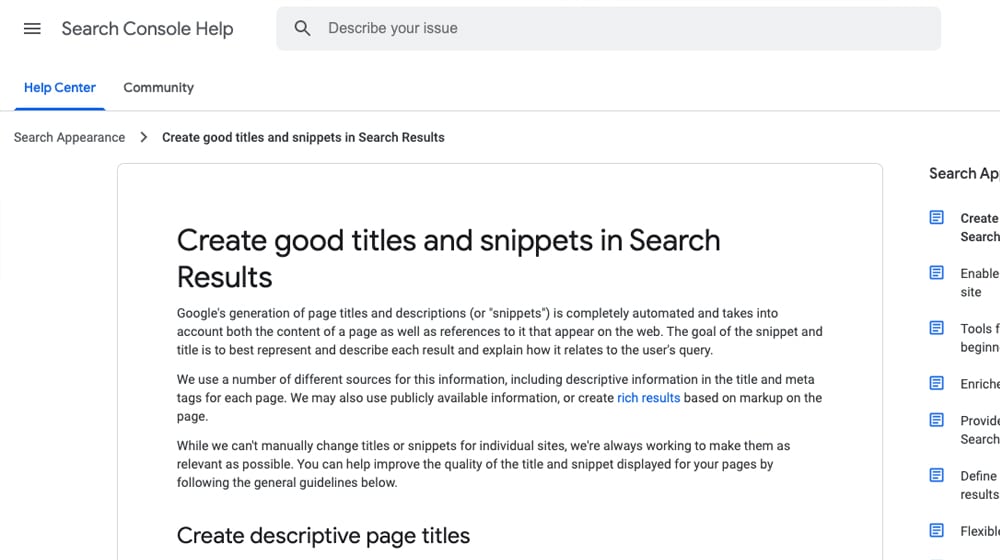
So what do they have to say?
"Google's generation of page titles and descriptions (or "snippets") is completely automated and takes into account both the content of a page as well as references to it that appear on the web. The goal of the snippet and title is to best represent and describe each result and explain how it relates to the user's query."
So far so good. Google generates its title and description for your site based on information from various sources. This includes the information you provide in your meta title and meta description, the content of the page itself in your H1 and your content, and how your content is referred to when it's linked to from other content.
"We use a number of different sources for this information, including descriptive information in the title and meta tags for each page. We may also use publicly available information, or create rich results based on markup on the page."
In other words, they'll use your meta information if they want to, but they can also use the content on the page. If you use Schema.org markup or other rich data, Google can do things like specifying more information for a featured snippet, give you a knowledge panel entry, or other kinds of rich results.
"While we can't manually change titles or snippets for individual sites, we're always working to make them as relevant as possible. You can help improve the quality of the title and snippet displayed for your pages…"
This is followed by their "best practices" list, which I'll go over momentarily. There's something important here, though. They won't manually go in and change your meta title and description, but their algorithm will happily make it whatever they think will work best for a query. What this means is that a page can have multiple titles and descriptions for different queries. And there's no way to tell, without checking your own results in search manually.
So what are Google's recommended best practices, with regards to meta descriptions? Titles are a little more fixed than descriptions, so I'm not as worried about them today.
"Google will sometimes use the <meta> description tag from a page to generate a search results snippet, if we think it gives users a more accurate description than would be possible purely from the on-page content."
There we have it. That third word is the most important one on the whole page. Google will sometimes use the meta description you specify. If they don't think your description is good enough, or it doesn't match the intent they see behind a query, they will 100% just ignore what you've specified in favor of pulling data from your page.
So what are Google's specific recommendations for writing meta descriptions? I'll summarize, but you can read them on the page I linked (and where I'm getting all of this information from) if you want Google's more detailed reasoning behind each point.
- Give every page a meta description. Even if Google doesn't use them, they want you to have them, just in case.
- Make sure every meta description is unique. Putting the same site-level meta description on every page virtually guarantees it will be ignored.
- Put facts about the page in the meta description. Google uses the example of a book where the description includes the author and illustrator, price, and length, rather than a plaintext description of the book. Hmm, interesting.
- Programmatically generate descriptions. Google outright says that if your site uses a lot of database-generated pages (like if you're a product aggregator) you can algorithmically generate your descriptions, and that's not only fine, but it's encouraged.
- Make sure your descriptions are actually descriptive. Here Google reinforces the idea that your description matters.
So, Google wants you to use a meta description that describes at the page level what your page is about. That tracks with what we know otherwise. The real question is this: how much of this does Google actually follow?
Test Queries
Now, I'm just a blogger and content marketing expert, not an industry giant like Moz or HubSpot, so there's only so much data I can easily collect. What I've done below is run three queries and tallied up whether or not the search results snippet I get is the same as the metadata the site has specified. Luckily enough, it's easy to check the metadata for a page in a browser.
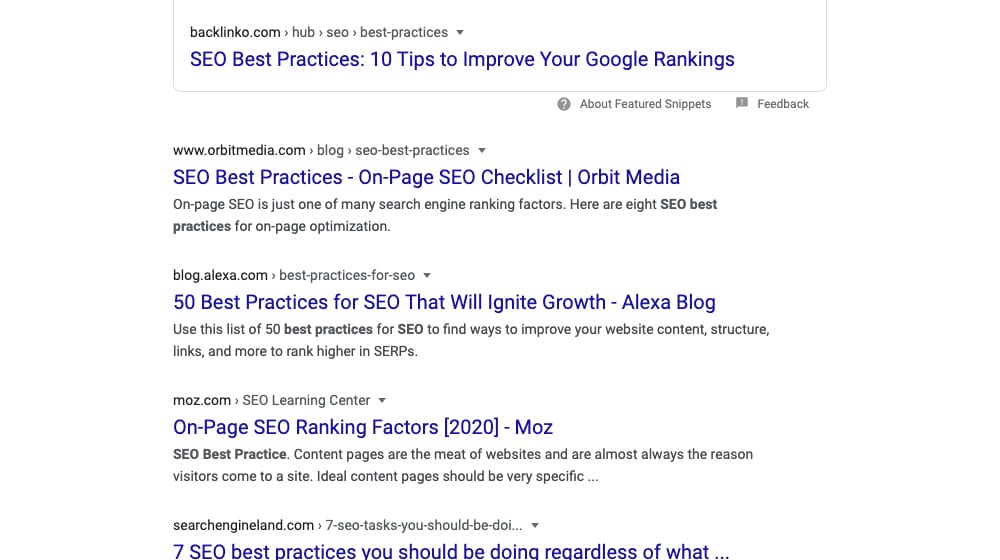
Here are my three queries:
- "SEO best practices" – I figure if anyone is guaranteed to have specified high-quality descriptions for their pages, it's the people who rank on the first page for SEO best practices.
- "hamburger recipes" – Food isn't very related to marketing, so some of these sites might not have descriptions. Plus, they're the kind of queries where Google would likely want to provide information in the description that is more helpful than what the recipe site might provide.
- "best running shoes" – Another area where marketers might not be on top of things, though I do figure the top results usually have marketers behind them.
I'm also ignoring the featured snippet because it has so little to do with the data the site specifies. Google just generates those on their own. That's actually a pretty good thing to mention; if you have a featured snippet, your meta description doesn't matter… for that query. Other queries might not generate a featured snippet, though, so you may still want to optimize it.
So what do we have in the top ten results for each query?
SEO Best Practices
Here are the top 10 results for the search phrase "SEO best practices":
- Backlinko – Featured Snippet.
- Orbit Media – Meta description does match the snippet.
- Alexa – Meta description does match the snippet.
- Moz – Meta description does not match snippet.
- Search Engine Land – Meta description does not match snippet.
- Google Support – Meta description does not match snippet.
- Ahrefs – Meta description does not match snippet.
- SEMRush – Meta description does not match snippet.
- InTechnic – Meta description does not match snippet.
- WordStream – Meta description does not match snippet.
So, of the 10 results, one is a featured snippet, two actually use the metadata specified, and the rest do not. That's 80% of the top 10 that ignores the meta description tag.
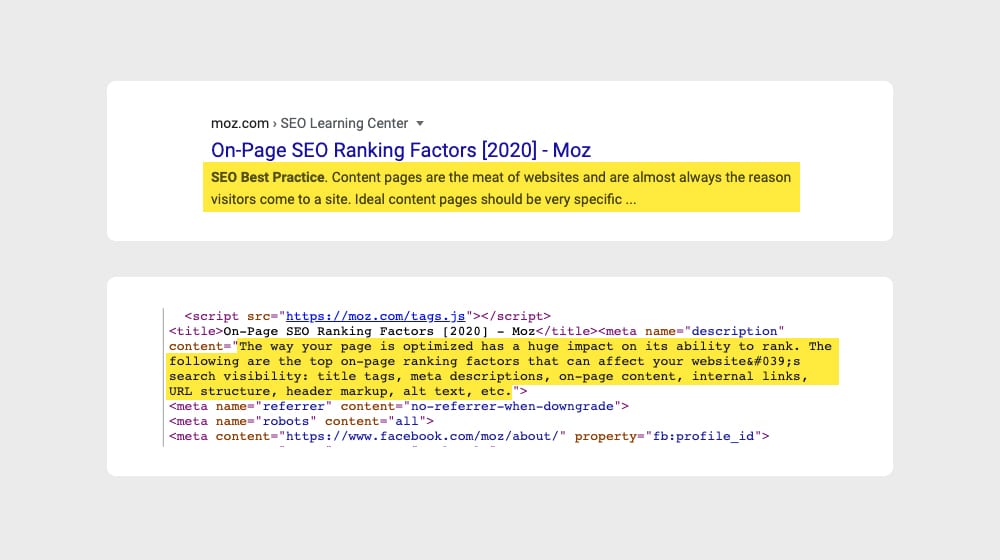
Among those ten, where does Google pull the data from? The featured snippet is, of course, just content from on the page. What about the other seven?
- Moz – The snippet here is pulled from a subheading and paragraph halfway down the page.
- Search Engine Land – The snippet here is the page title and subtitle.
- Google Support – The snippet here comes from halfway through the first paragraph.
- Ahrefs – The snippet here is the title, plus the author, shares, and even the drop-down for language selection. Google showing me the language selector is a bit unusual.
- SEMRush – The snippet here is just the blog post title, which is also the snippet and meta title.
- InTechnic – The snippet here is just the page title, the share count, and the first few words of the first paragraph.
- WordStream – The snippet here is the subheading and first sentence of their second subheading.
There seems to be very little rhyme or reason behind these results, and some oddities. Adding in a language drop-down? Adding in share counts? Google trying to provide the most attractive information here isn't doing a very good job.
Now let's look at the second query.
Hamburger Recipes
Note that there's a featured snippet here, but it pulls results data from several of the pages listed below it, so there's some duplication. It's more of a knowledge panel than a featured snippet. As such, there are only nine truly organic results. I'll list whether or not the snippet matches and where the data is from on the same list this time.
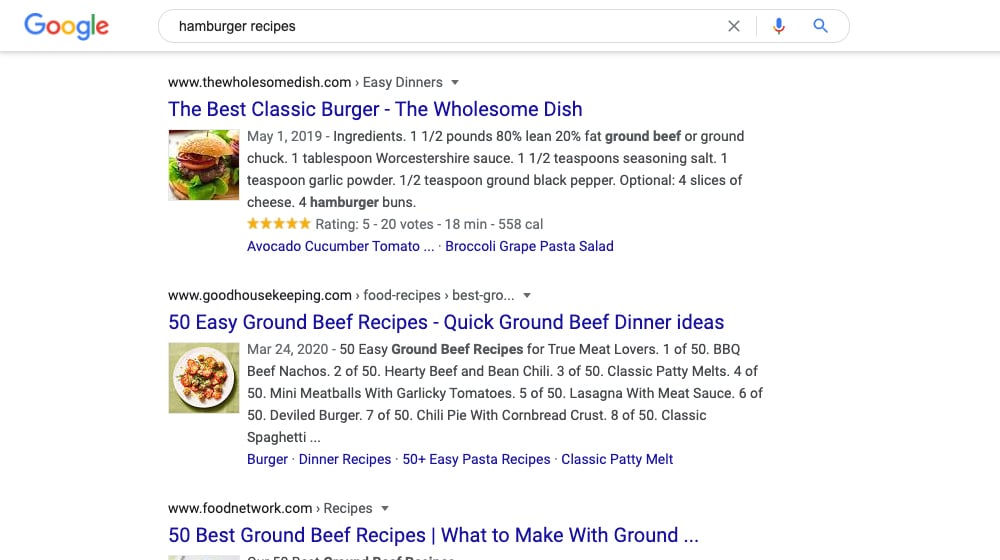
Here's the search results for the phrase "hamburger recipes":
- The Wholesome Dish – The snippet does not match and the data is pulled from the recipe box.
- Good Housekeeping – The snippet does not match and the data is pulled from the subheads of the gallery.
- Food Network – The snippet does match, however, the data is also on the page itself as well as the meta description tag.
- Spend With Pennies – The snippet does not match and the data comes from a subheading and bullet list from the instructions section.
- AllRecipes – The snippet does match, however, the data is also on the page itself as well as the meta description tag.
- Once Upon a Chef – The snippet is used appropriately.
- Country Living – The snippet is used appropriately.
- Delish – The snippet does not match and the data is the post title and subtitle.
- Food And Wine – The snippet does not match and the data is pulled from the first paragraph of the page content.
So, here we have nine more pages, and of them, only two of them can be confirmed to be using the meta tag properly. Two more are using the meta tag, but the meta tag is pulled from the content, making me assume it's algorithmic generation as Google mentioned using up above. That's a 77% failure rate to using the meta tag properly. So how about the third query?
Best Running Shoes
There's no featured snippet for this query, so all of the results should, you would think, use the meta tag as specified.
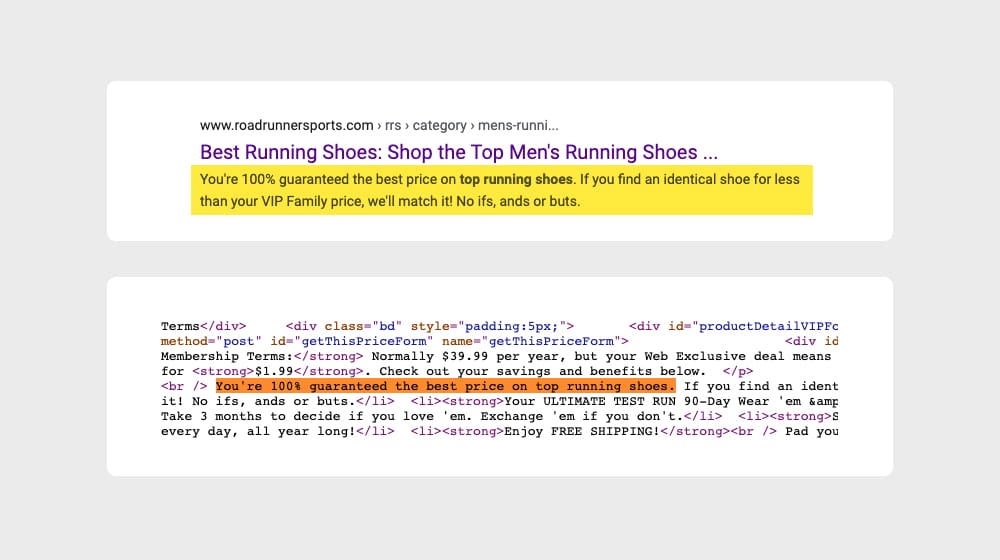
Let's find out.
- Runner's World – Meta description does match snippet.
- Fleet Feet – The snippet does not match and the data comes from the last sentence of the third paragraph.
- T3 – The snippet does not match and the data is seemingly randomly pulled from the featured shoes and is not contiguous from within the page.
- Esquire – The snippet does not match and the data is the page title and subtitle.
- Run Repeat – The snippet does not match and the data comes from the FAQ at the bottom of the page.
- Running Shoes Guru – The snippet does not match and the data comes from one of the sub-sections subheading and description.
- Roadrunner Sports – This page does not specify a meta description tag. Google used content that was on the page, though that content was hidden and only visible by checking their source code. Very odd.
- Get Sweat Go – The snippet does not match and the data comes from a subheading and entry halfway down the page.
- GearPatrol – The snippet does not match and the data comes from one of the sub-categories down below.
- CNet – The snippet does not match, sort of. The meta description is the page's subtitle, but the snippet is both the title and subtitle.
So here we have another 10 results, and a 90% failure rate to use the specified meta description, though one of them is slightly cheating because the page doesn't even specify a tag.
Overall, that's 29 search results, and only 5 of them actually use the meta description the site owner specified, without a confounding variable like that text also being used on the page itself.
Should You Care About Meta Descriptions?
Now, obviously, I have a very small sample size here. If anyone out there with more resources and more patience decides to do a larger study, I'd love to see the results, so shoot me an email if you do one.
That said, it's really not looking good for the meta description tag. Google says you should always specify one, but… why? Only 17% of my tested query results used it.
Even worse is the data that Google uses to replace a meta description. Among all the sites that specified meta tags that weren't used, the meta description would have honestly been a little better. Google's site crawling bot pulls data to use and that data isn't always relevant or even useful. Some of them used poorly formatted mixtures of data from the page. Some of them just repeated the page title directly below the title in the snippet. Some of them (like Ahrefs) even used data the user wouldn't find useful in most contexts.
Now, I'm going to be honest here. At the moment, I'm not going to stop using meta tags. It only takes me a few minutes to optimize and write them for any post that I publish, so even if Google doesn't use them, it's not exactly a huge workload. If Google does use them for some queries, even better.
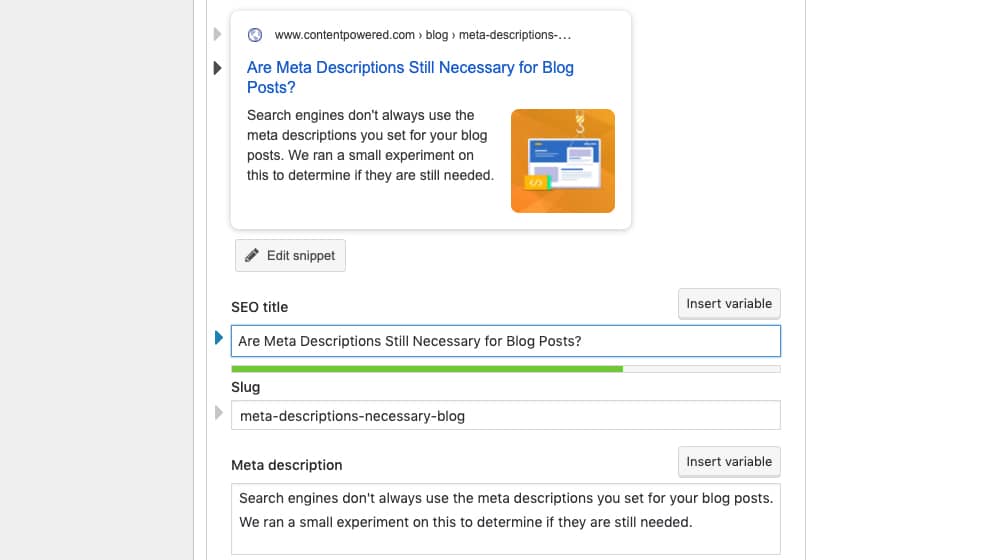
I suppose the next test would be to either remove meta descriptions from my pages and see if search ranking drops, or run some tests with future posts to see if they take a hit if I don't specify them. I'm not sure I want to run that experiment myself, though, when a large research firm like HubSpot could do it with a much larger sample size.
Either way, it's interesting to see just how little Google seems to care about the meta data you specify.
Do you still specify meta descriptions? If you've stopped, did you see a drop in ranking or traffic? I'm curious. Let me know in the comments!




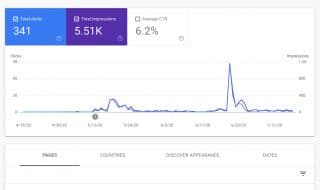
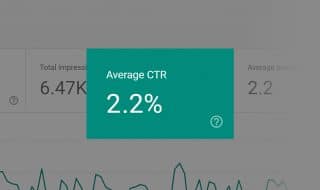




August 07, 2021
Great info here.
It's so weird that marketers place all of this importance on meta tags when so many of them aren't even being used by search engines.
August 12, 2021
Thanks, Jason!
I agree; I've seen this across hundreds of blogs and websites, too. We still fill them out just in case, but it is an interesting pattern to take note of.
It probably isn't as big of a ranking factor as most marketers make it out to be, but I'm not brave enough to test that theory and skip them entirely 🙂
January 20, 2022
This is a great dive into this topic. It's frustrating to see my people stress about the meta descriptions when it seems to have a lesser impact these days.
January 21, 2022
Thanks Robert!